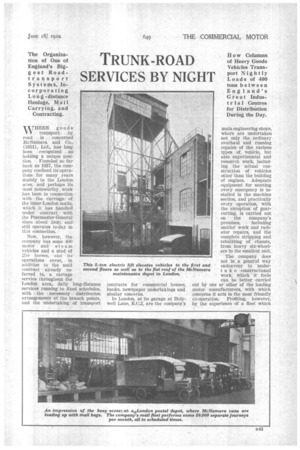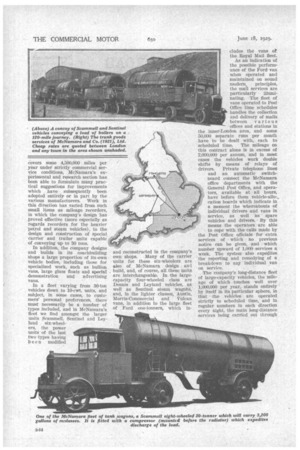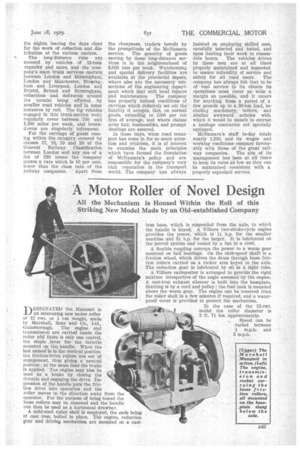TRUNK-ROAD SERVICES BY NIGHT
Page 121

Page 122

Page 123

If you've noticed an error in this article please click here to report it so we can fix it.
AVH"'goods . . • transport by road is . concerned McNamara and Co., (1921), • Ltd:, has long been . recognized as holding a unique position. Founded so-far back as 1837, the company confined.its operations for many years mainly to the London area; and perhaps its most noteworthy work has been in connection with .the carriage of the inner-London mails, Which it has handled under. contract with the Postmaster-General since about 1810, and still operates to-day in this connection. • •
Now, however, the company has some 400 motor and steam vehicles and a stud of 250 horses, and iis operations cover, in addition to the mail contract already referred to,: a cartage service, throughout the .
London area, daily long-distance services running to fixed schedules, with the necessary distribution arrangements at the branch peints, and the undertaking of transport
contracts for • commercial,houses, banks, newspaper undertakings and.
similar concerns. • ..• in London, at its garage at Holy-.
well•Lane, E.C.2, are the company's.
. . . main engineering shops, where are undertaken not only the ordinary overhaul and running repairs of the various types of vehicle, but also experimental and research work, including the actual construction of vehicles other than the building of engines. Adequate equipment for meeting every emergency is installed in the 'machine section, and practically every operation, with the exception of gearcutting, is carried out on the company's premises, including smiths' wOrk and radiator repairs, and the complete stripping and rebuilding of chassis, from heavy six-wheelers to the smallest unit.
Thea company does not in a general way endeavour to undertake constructional work, which it feels
can be better carried out by one of other of the leading potor manufacturers, with which concerns it acts in the most friendly co-operation. Profiting, however, by the experience of a fleet which covers some 4,500,000 miles per year under strictly commercial service conditions, McNamara's experimental and research section has been able to forthulate many practical suggestions for improvements which have subsequently been adopted entirely or in part by the various manufacturers. Work in this direction has varied from such small items as mileage recorders, in which the company's design has proved effective (more especially as regards recorders for the heavier petrol and steam vehicles), to the design and construction of special carrier and trailer units capable of conveying up to 30 tons.
In addition, the company designs and builds in its coachbuilding shops a large proportion of its .own vehicle bodies, including those for specialized work, such as bullion vans, large glass floats and special demonstration and advertising vans.
In a fleet varying from 30-ton vehicles down to 10-cwt. units, and subject, in some cases, to customers' personal preferences, there must necessarily, be a number of types included, and in McNamara's fleet we find amongst the larger units Scaminell, Sentinel and Leyland six-wheelers, the power units of the last two types having been modified and reconstructed in the company's own shops. Many of the carrier units for these six-wheelers are also of McNamara design and build, and, of course, all these units are interchangeable. In the largecapacity four-wheeled class are Dennis and Leyland vehicles, as well as Sentinel steam wagon, and, in the lighter classes, Austin, Morris-Commercial and Vulcan vans, in addition to the large fleet of Ford one-tonners, which in eludes the vans the Royal Royal Mail fleet.
As an indication of the possible performance of the Ford van when operated and maintained on sound modern principles, the mail services are particularly illuminating. The fleet of vans operated to Post Office time schedules handles the collection and delivery of mails between various offices and stations in the inner-London area, and some 50,000 separate runs per month have to be dealt with, each to scheduled time. The mileage on this contract alone is in excess of 2,000,000 per annum, and in most cases the vehicles work double shifts by means of relays of drivers. Private telephone lines and an automatic switchboard connect the McNamara office departments with the General Post Office, and operators, available at all hours, have before them vehicle-alio-, cation boards which indicate in a moment the whereabouts of individual drivers and vans in service, as well as spare vehicles and drivers. By this means the operators are able to cope with the-Calls made by the Post Office officials for extra services of Which no previous notice can be. given, and which number upward of 1,000 services a week. The Syatem also expedites the reporting and remedying of a breakdown to any individual van on service.
. The cOmpany's long-distance fleet of large-capacity vehicles, the mileage of which touches well over 1,000,000 per year, stands entirely by itself in its particular sphere, in . that the• vehicles are operated strictly to scheduled time, and in regular numbers in each direction every night, the main long-distance services being carried out through the nights, leaving the days clear for the work of collection and distribution at the various centres.
The long-distance runs are covered by vehicles of 13-tons capacity and more, and the company's main trunk services operate between London and Birmingham, London and Manchester, Birmingham and Liverpool, London and Bristol, Bristol and Birmingham, collections and deliveries around the termini being effected , by smaller road vehicles and in some instances by rail. The big vehicles engaged in this trunk-service wor,Il regularly cover between 700 and 1,200 miles per week, and breakdowns are singularly infrequent.
For the carriage of goods corning within the category covered by classes 17, 18, 19 and 20 of the General Railway Classification between London and any one of a list of 230 towns the company quotes a rate which is 10 per cent. lower than the class rate of the railway companies. • Apart from the cheapness, traders benefit by the promptitude of the McNamara service. The quantity of goods moving by these long-distance services is in the neighbourhood of 3,000 tons per week. Warehousing and special delivery facilities are available at the provincial depots, where also are the necessary subsections of the engineering department which deal with local repairs and• maintenance. The company has properly defined conditions of carriage which definitely set out the' liability it accepts, this, on normal goods, extending to £200 per ton free of average, and where claims arise fair, businesslike, and prompt dealings are assured.
In these days, when road transport has come in for so much attention and criticism, it is of interest to examine the main principles which have formed the foundation of McNamara's policy and are responsible for the company's very high reputation in the transport world. The company has always insisted on employing skilled men, carefully Selected and tested, and upon limiting their work to reason able hours. The vehicles driven by these men are at all times properly maintained and inspected to ensure reliability of service and safety for all road users. The company has always felt that to be of real service to its clients its operations must cover as wide a margin as possible, and it caters for anything from a parcel of a few pounds up to a 30-ton load, including machinery, boilers, and similar awkward articles with which it would be unsafe to entrust a haulage contractor not specially equipped.
McNamara's staff to-day totals nearly 1,200, and its wages and working conditions compare favourably with those of the great railway companies. The aim of its management has been at all times to keep its rates as low as they can be maintained consistent with a properly organized service.








































































































































































































